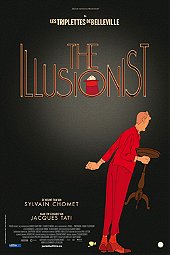Beautifully animated but, despite its excellent pedigree, never quite works
Marred by something of a family feud over whether Jacques Tati's semi-autobiographical screenplay (co-written by an uncredited Henri Marquet) that lay forgotten and unfilmed for several decades was inspired by the illegitimate daughter he abandoned or the legitimate one he felt guilty for ignoring and to whom the film is dedicated (in truth it seems a mixture of both), Sylvain Chomet's followup to Belleville Rendezvous, the beautifully animated L'Illusionniste aka The Illusionist, comes with an excellent pedigree but somehow never quite works.
Despite the role originally being intended for Pierre Etaix, Tati himself is recreated in animated form as stage magician Tatischeff (his real name) with a vicious rabbit that hates him who is forced to travel ever further afield to find work as the dying music hall finally succumbs to the twin threats of rock'n'roll and TV. Tatischeff is at once recognisably Tati and yet not Tati: like its writer, the character is an awkward presence on the sidelines of a world he doesn't quite fit in even in scenes built around him, but he lacks Tati's screen presence and ability to seem as if he had accidentally stumbled into his surroundings. As per Tati's own films, it's fundamentally a silent movie: what little dialogue there is is a mixture of French, English and Gaelic but mostly gibberish that's universally understandable. Unlike his later films there's a stronger narrative spine that sees a poor Scottish girl so enchanted by the gifts she believes he really has produced by magic adopting him and following him on his travels, but while there are amusing moments, like the rabbit stew supper, and some nice sight gags, the heart is never really there, keeping us at a remove. Both main characters are remote and with the few supporting characters either suicidally desperate or casually unscrupulous, it becomes hard to genuinely care.
Many complained that Chomet's adapted screenplay substantially watered down Tati and Marquet's original, which dealt much more directly with the void between Tatischeff's stage persona and the fallible real man as he keeps up the deception that his magic is real to avoid disillusioning the girl, only for her boyfriend to ultimately expose them as cheap tricks. In Chomet's version, she simply starts to outgrow him as she falls in love, the film almost winding down inconclusively rather than coming to a point. Instead the film's pleasures are purely visual: the animation is beautiful and the British countryside and, in particular, the city of Edinburgh beautifully rendered, the camera often taking to the skies and flying around them as if to express the joy the characters never realise. It's a film I'd really like to love, but for all the genuine artistry on display it just wouldn't let me in.
The UK DVD has a fine unsubtitled widescreen transfer and, chief among the initially frugal looking extras (brief featurette, stills gallery and trailer), a not entirely convincing 75-minute Q&A with Sylvain Chomet, who seems to tell a different version of the story behind the film in every interview he gives and occasionally seems more than a little short-tempered when anyone tries to get him to clarify things.
 Login
Login